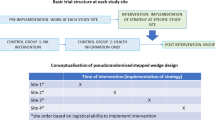Conclusion
Until now the WHO ARI programme has concentrated its efforts on the development of intervention strategies and the preparation of managerial tools to support the implementation of control activities in developing countries. Pilot studies and operational surveys have been carried out in a number of countries; guidelines on case management and health education have been worked out together with the corresponding training modules, protocols for etiological studies and drug resistance surveillance have been elaborated and a system to disseminate information has been established.
Similar content being viewed by others
References
World Health Organization. Seventh General Programme of work covering the period 1984–1989. WHO, 1982
Leowski, J. Mortality from acute respiratory infections in children under 6 years of age: Global estimates.World Hlth Stat Quart 1986;39 : 138–144
Pio A, et al. The magnitude of the problem of acute respiratory infections. Proceedings of an International Workshop on Acute Respiratory Infections in Childhood (Sydney, August 1984). University of Adelaide, Australia, 1985, pp 3–16
Shann, F. Etiology of severe pneumonia in children in developing countries.Pediatr Infect Dis J 1986;5: 247–252
World Health Organization. Case management of acute respiratory infections in children in developing countries. Document WHO/ RSD/85. 5, Rev. 2
World Health Organization. Respiratory Infections in Children at Small Hospitals : Background Notes and a Manual for Doctors. Document WHO/RSD/86. 26
World Health Organization. Acute Respiratory Infections : A Guide for the Planning, Implementation and Evaluation of Control Programmes within Primary Health Care. Document WHO/RSD/86 29
World Health Organization Regional Office for South-East Asia. Acute Respiratory Infections in South-East Asia : Report of an intercountry meeting, New Delhi, 8–11 October, 1986. WHO, SEARO Technical Publications No. 8, 1986
WHO/UNICEF Joint Statement on Basic Principles for Control of Acute Respiratory Infections in children in developing countries. WHO/UNICEF, Geneva 1986
Datta N, Kumar V, et al. Case management in the control of acute respiratory infections in low birth weight infants : a feasibility study.Bull Wld Hlth Org 1987 (in press).
Mtango FDE, Neuvians D. Acute respiratory infections in children under five years. Control project in Bagamoyo District, Tanzania.Trans Roy Soc Med Hyg 1986;80: 851–858
Indoor Air Pollution Study, Maragua Area, Kenya. Document WHO/PEP/87.1—WHO/ RSD/87. 32, 1987
Author information
Authors and Affiliations
Rights and permissions
About this article
Cite this article
Pio, A. WHO programme on acute respiratory infections. Indian J Pediatr 55, 197–205 (1988). https://doi.org/10.1007/BF02722181
Issue Date:
DOI: https://doi.org/10.1007/BF02722181




